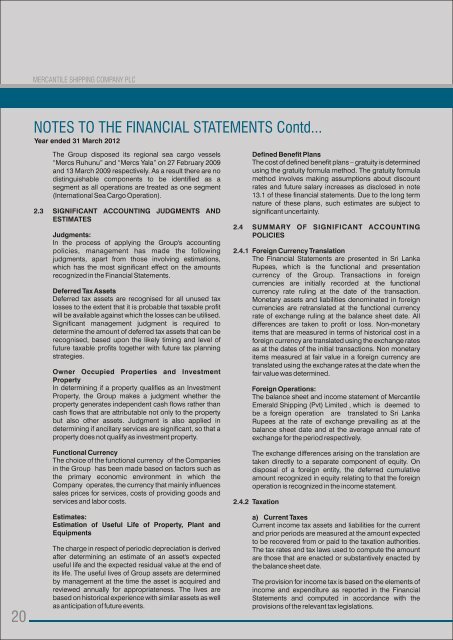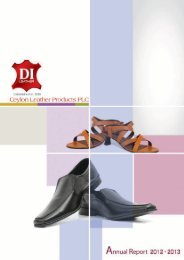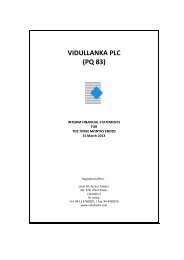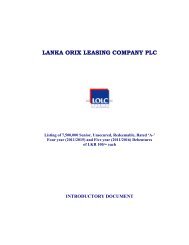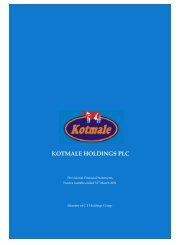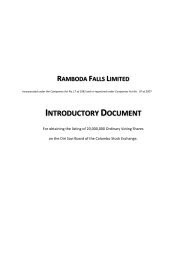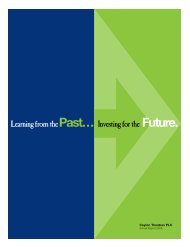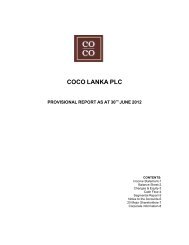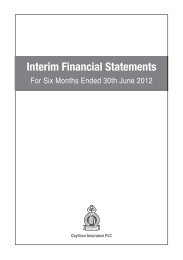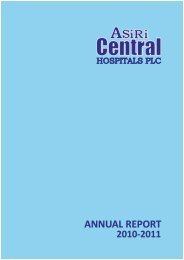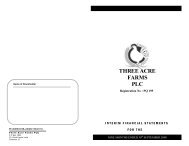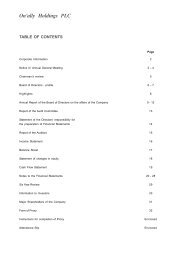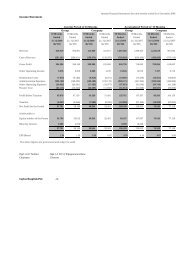Annual Report 2011/2012 - Colombo Stock Exchange
Annual Report 2011/2012 - Colombo Stock Exchange
Annual Report 2011/2012 - Colombo Stock Exchange
You also want an ePaper? Increase the reach of your titles
YUMPU automatically turns print PDFs into web optimized ePapers that Google loves.
MERCANTILE SHIPPING COMPANY PLC<br />
NOTES TO THE FINANCIAL STATEMENTS Contd...<br />
Year ended 31 March <strong>2012</strong><br />
20<br />
The Group disposed its regional sea cargo vessels<br />
“Mercs Ruhunu” and “Mercs Yala” on 27 February 2009<br />
and 13 March 2009 respectively. As a result there are no<br />
distinguishable components to be identified as a<br />
segment as all operations are treated as one segment<br />
(International Sea Cargo Operation).<br />
2.3 SIGNIFICANT ACCOUNTING JUDGMENTS AND<br />
ESTIMATES<br />
Judgments:<br />
In the process of applying the Group's accounting<br />
policies, management has made the following<br />
judgments, apart from those involving estimations,<br />
which has the most significant effect on the amounts<br />
recognized in the Financial Statements.<br />
Deferred Tax Assets<br />
Deferred tax assets are recognised for all unused tax<br />
losses to the extent that it is probable that taxable profit<br />
will be available against which the losses can be utilised.<br />
Significant management judgment is required to<br />
determine the amount of deferred tax assets that can be<br />
recognised, based upon the likely timing and level of<br />
future taxable profits together with future tax planning<br />
strategies.<br />
Owner Occupied Properties and Investment<br />
Property<br />
In determining if a property qualifies as an Investment<br />
Property, the Group makes a judgment whether the<br />
property generates independent cash flows rather than<br />
cash flows that are attributable not only to the property<br />
but also other assets. Judgment is also applied in<br />
determining if ancillary services are significant, so that a<br />
property does not qualify as investment property.<br />
Functional Currency<br />
The choice of the functional currency of the Companies<br />
in the Group has been made based on factors such as<br />
the primary economic environment in which the<br />
Company operates, the currency that mainly influences<br />
sales prices for services, costs of providing goods and<br />
services and labor costs.<br />
Estimates:<br />
Estimation of Useful Life of Property, Plant and<br />
Equipments<br />
The charge in respect of periodic depreciation is derived<br />
after determining an estimate of an asset's expected<br />
useful life and the expected residual value at the end of<br />
its life. The useful lives of Group assets are determined<br />
by management at the time the asset is acquired and<br />
reviewed annually for appropriateness. The lives are<br />
based on historical experience with similar assets as well<br />
as anticipation of future events.<br />
Defined Benefit Plans<br />
The cost of defined benefit plans – gratuity is determined<br />
using the gratuity formula method. The gratuity formula<br />
method involves making assumptions about discount<br />
rates and future salary increases as disclosed in note<br />
13.1 of these financial statements. Due to the long term<br />
nature of these plans, such estimates are subject to<br />
significant uncertainty.<br />
2.4 SUMMARY OF SIGNIFICANT ACCOUNTING<br />
POLICIES<br />
2.4.1 Foreign Currency Translation<br />
The Financial Statements are presented in Sri Lanka<br />
Rupees, which is the functional and presentation<br />
currency of the Group. Transactions in foreign<br />
currencies are initially recorded at the functional<br />
currency rate ruling at the date of the transaction.<br />
Monetary assets and liabilities denominated in foreign<br />
currencies are retranslated at the functional currency<br />
rate of exchange ruling at the balance sheet date. All<br />
differences are taken to profit or loss. Non-monetary<br />
items that are measured in terms of historical cost in a<br />
foreign currency are translated using the exchange rates<br />
as at the dates of the initial transactions. Non monetary<br />
items measured at fair value in a foreign currency are<br />
translated using the exchange rates at the date when the<br />
fair value was determined.<br />
Foreign Operations:<br />
The balance sheet and income statement of Mercantile<br />
Emerald Shipping (Pvt) Limited , which is deemed to<br />
be a foreign operation are translated to Sri Lanka<br />
Rupees at the rate of exchange prevailing as at the<br />
balance sheet date and at the average annual rate of<br />
exchange for the period respectively.<br />
The exchange differences arising on the translation are<br />
taken directly to a separate component of equity. On<br />
disposal of a foreign entity, the deferred cumulative<br />
amount recognized in equity relating to that the foreign<br />
operation is recognized in the income statement.<br />
2.4.2 Taxation<br />
a) Current Taxes<br />
Current income tax assets and liabilities for the current<br />
and prior periods are measured at the amount expected<br />
to be recovered from or paid to the taxation authorities.<br />
The tax rates and tax laws used to compute the amount<br />
are those that are enacted or substantively enacted by<br />
the balance sheet date.<br />
The provision for income tax is based on the elements of<br />
income and expenditure as reported in the Financial<br />
Statements and computed in accordance with the<br />
provisions of the relevant tax legislations.


